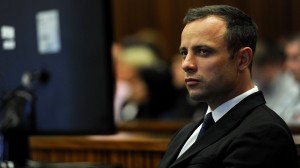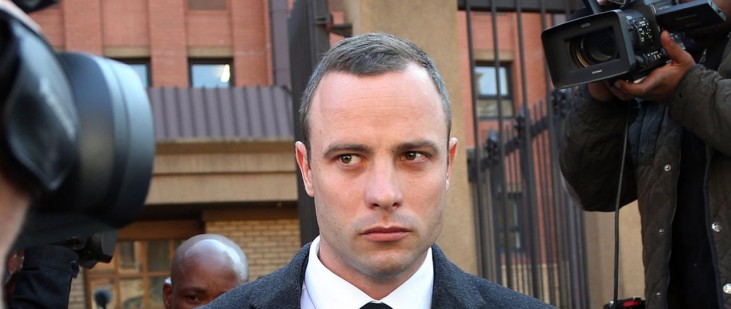By Judith Edersheim, JD, MD; CLBB Co-director
Yesterday, Paralympian Oscar Pistorius presented himself to Weskoppies Psychiatric Hospital to begin a month long psychiatric evaluation. This evaluation was ordered by the judge presiding in his case after his defense attorney called a witness to describe his mental state at the time he shot his girlfriend Reeva Steenkamp. Forensic psychiatrist Dr. Merryll Vorster testified that Mr. Pistorius suffers from a generalized anxiety disorder, and that when faced with a “fight or flight situation,” his instinct is to fight. The defense team’s introduction of this kind of evidence this late in the game opened a kind of psychiatric second front for the prosecution. Did introduction of this evidence signal that Mr. Pistorius is backing away from the claim that he acted reasonably in favor of the idea that he acted under the influence of a mental disorder? Is there credible evidence that he had a serious mental disorder and, if so, would it “count” for exculpation or mitigation? Could a closer examination of these claims “backfire” and seal Mr. Pistorius’ fate?
Prior to Dr. Vorster’s testimony, the bulk of the defense case rested on the assertion that Mr. Pistorius thought an intruder was in his bathroom when he fired shots thorough the door, and that his actions were a rational and appropriate response. In order to shift gears and put forth an insanity defense, the attorneys now would have to claim that Mr. Pistorius was not acting rationally or proportionately but was “mentally incapacitated” during the shooting and either could not appreciate the wrongfulness of his actions or could not act in accordance with such appreciation. This would run counter to the bulk of the defense case that came before it. More likely, defense attorneys thought that Dr. Vorster’s testimony would provide a helpful psychological backdrop for Mr. Pistorius’ insistence that he felt extremely vulnerable to attack. The defense clearly wished to insert this psychological testimony into the motivations mix without much scrutiny, as it adamantly opposed a further independent psychiatric evaluation, and lost big on that issue.
 At Weskoppies, the defense psychiatrist’s claims will be meticulously scrutinized for consistency and diagnostic validity. Dr. Vorster testified that Mr. Pistorius would have experienced the loss of his legs at age 11 months as traumatic assault, with a lasting legacy of psychological trauma. She also testified that Mr. Pistorius’s loss of his mother at age 15 and his estrangement from his father had a negative effect on his functioning. Dr. Vorster stated that his resulting anxiety disorder is manifest in his excessive security concerns, friendships lacking in depth, and frequent short-term sexual relationships. Three psychiatrists will have thirty days to examine and test these conclusions using medical records, patient interviews and psychological and neuropsychological test batteries. Is there any evidence that the symptoms Mr. Pistorius now reports impaired his functioning at home or at school during his childhood? Is this notion of fight instead of flight consistent with Mr. Pistorius’s previous gun use or aggressive encounters?
At Weskoppies, the defense psychiatrist’s claims will be meticulously scrutinized for consistency and diagnostic validity. Dr. Vorster testified that Mr. Pistorius would have experienced the loss of his legs at age 11 months as traumatic assault, with a lasting legacy of psychological trauma. She also testified that Mr. Pistorius’s loss of his mother at age 15 and his estrangement from his father had a negative effect on his functioning. Dr. Vorster stated that his resulting anxiety disorder is manifest in his excessive security concerns, friendships lacking in depth, and frequent short-term sexual relationships. Three psychiatrists will have thirty days to examine and test these conclusions using medical records, patient interviews and psychological and neuropsychological test batteries. Is there any evidence that the symptoms Mr. Pistorius now reports impaired his functioning at home or at school during his childhood? Is this notion of fight instead of flight consistent with Mr. Pistorius’s previous gun use or aggressive encounters?
Neither American nor South African courts would give credence to a mental disorder if it conveniently appeared only after being charged with a violent crime, or manifested itself only in self- serving situations. Did Mr. Pistorius ever report psychiatric symptoms to a treater, coach, or medical evaluator prior to the shooting of Ms. Steenkamp? Had he sought treatment? If he made any reports of anxiety or hyper-vigilance to previous treaters, this would certainly be relevant to the inquiry. Mr. Pistorius, a world-class athlete, may have consulted psychologists and other performance experts long before these tragic events. They may have valuable collateral evidence.
Even if there is good clinical support for a generalized anxiety disorder or PTSD, the disorder could be true, true and unrelated to the shooting. For any mitigation, the defense would have to show that the disorder played a significant role in Mr. Pistorius’ specific actions on the night in question. This means establishing a causal relationship between his psychiatric symptoms and his behavior on the night Steenkamp was killed. While anxiety disorders, and in particular PTSD, have formed the basis of mental state defenses in American criminal trials, it requires a demonstration that symptoms like hypervigilance or disinhibition interfered with rational thought processes or the ability to exercise self control. In Mr. Pistorius’ case, this will clearly be an uphill battle, as the defense psychiatrist has already admitted under cross-examination that the anxiety disorder she diagnosed did not impair his ability to tell right from wrong. The remaining best-case scenario for the defense would be a finding that his anxiety made him less able to form appropriate behavioral responses when under duress. This a conclusion has limited mitigating potential and threatens to undermine the theory of ordinary mistake.
So why did the defense fight so vigorously against this independent evaluation? Because in criminal trials, a psychiatric evaluation can be a dangerous double edged sword. Illnesses beyond personal control sometimes mitigate by decreasing blameworthiness, and sometimes aggravate by revealing violent impulses that frighten the public and support the logic of incarceration. The panel will be free to diagnose Mr. Pistorius with whatever disorder (or lack thereof) is supported by the evidence; the entire record, including any evidence of grandiosity, rejection sensitivity, and jealous rage, will be taken into account. It may be that the three psychiatrists will view a preoccupation with weapons, the need for admiration, and superficial personal relationships as narcissistic or antisocial character traits. Neither of these personality constellations would cast a favorable light on Mr. Pistorius’ motivations on the night in question – nor on any other night for that matter. An in depth evaluation might portray him as a volatile aggressor with an insatiable appetite for the sort of international adulation that has already attended the trial and its coverage. In retrospect, introducing Dr. Vorster’s opinion might have been a defining error. Perhaps a defendant with an anxiety disorder; most likely an anxious defense team.



